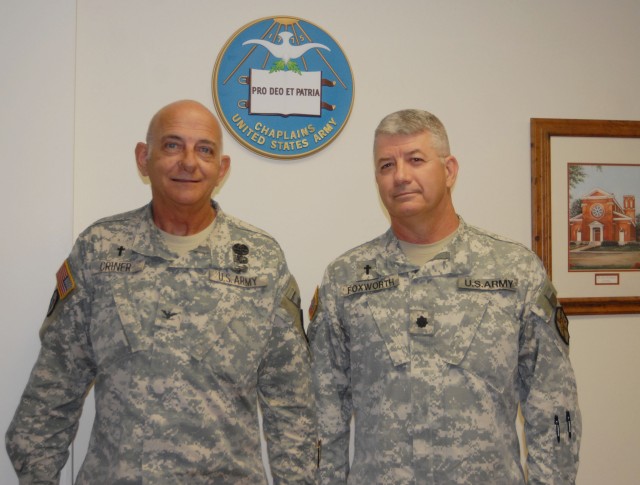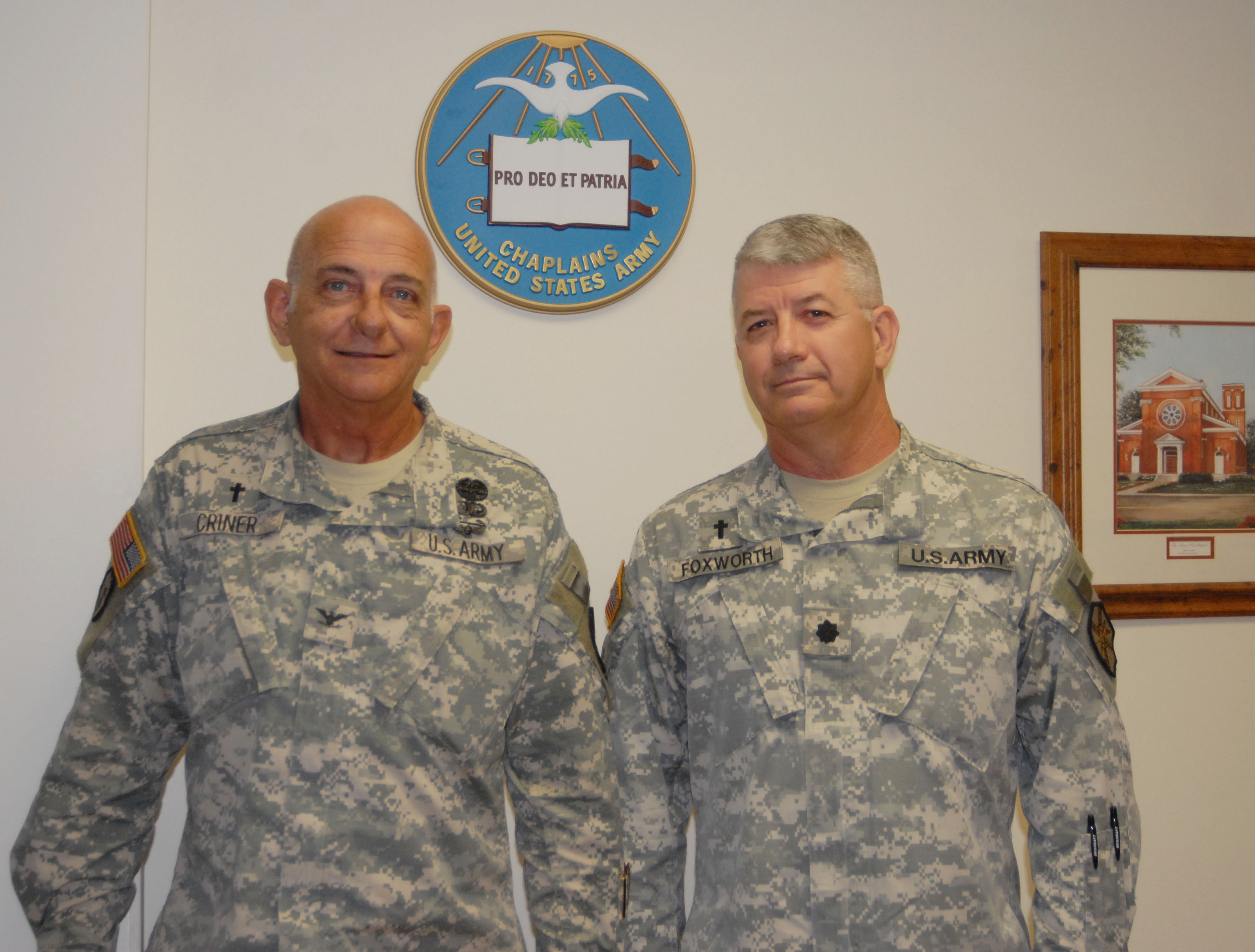
The Vietnam War ended in 1975. But for many veterans, the 10-year conflict still lives in their minds as if it happened only yesterday. Those memories often include the hostile treatment and cold reception they received from fellow Americans upon returning home.
"There was no reception," recalled Chaplain (Col.) Roger Criner. "When I came home, we came home (one at a time)...the only person that met me at the airport was my wife."
He even had a difficult time securing employment because he was seen as a "killer."
"It was almost as though you had an incurable disease that was contagious," he said.
Fellow Chaplain (Lt. Col.) Mickey Foxworth, who was serving in the Air Force when he was sent to Vietnam, arrived back in the states at Los Angeles International Airport in uniform only to be jeered at and even have someone spit in his face. He immediately changed clothes before he continued his journey home.
Both men were stationed in Vietnam when they were 20 years old, but had different experiences. Col. Criner was a combat medic in the Army and Lt. Col. Foxworth was an intelligence analyst for the Air Force-their service as chaplains came much later.
Col. Criner recalled how he was injured in Vietnam on Dec. 13, 1970. He and his recon unit had been called in and were involved in ground fire with the Viet Cong when his platoon leader called in the Cobra gunship helicopters, which came from the opposite direction, resulting in the chaplain and his receiving friendly fire.
"(The platoon leader) radioed (the Cobras) and had them come in from the opposite direction," said Col. Criner. "When they did, they fired on us. There were 20 wounded, to include the platoon leader. I got shrapnel in the back and legs."
He talked about a fellow Soldier, Sgt. Bernard Wilcox.
"We got into the contact ... and the Cobras got on top of us, (Sgt. Wilcox) got shrapnel in the back of his head and his brain was protruding out of his skull. And I bandaged him up," he said. "I went to the 93rd Evac Hospital seven days later to see about him. The attending physician told me that he would never walk again, he'd never talk again, and he'd never see again because of his brain injury.
"A few weeks went by...and I got the address to his mother, and I wrote her a letter and I explained in detail what happened. I wasn't supposed to do that, but I did. And I received a thank you letter from his mother shortly thereafter. A couple of months went by and I received another letter. It was from his sister. And the last paragraph of the letter was written by Sgt. Wilcox. He was able to walk, he was able to speak, and he had (vision) in one eye."
Chaplain Criner took a long pause before he continued.
"If I had an address in Florida (for Sgt. Wilcox)...I'd be on a plane tomorrow. That's one of the greatest griefs that I carry with me today, and I usually encourage the others don't make the same mistake," he said.
"That's grief delayed," added Chaplain Foxworth. "I think we all had that because at that moment you couldn't comprehend what was going on. The night that our plane was shot down over the Ho Chi Minh trail ...(we) never had time to talk about it, to think about it. What made that more poignant for me was I was supposed to be on that plane. (But) we (had) orders from (the National Security Agency), 'Don't put an analyst on the bird.' In fact (my friend Pete) took my place. I carried that guilt for a long, long time. But I did what I was told to do.
"When you get back home, you have all this stuff inside, and people outside don't have a clue. For a while I was angry. I felt like I had stood up and done what my country asked for, but I was abandoned. And it angered me that we were slammed in the press, we were denigrated across the board, we were all bunched in one lump and everybody was a baby-killer and most of us...if we did anything with any babies-we held them in our arms," he explained.
Even though neither Soldier was a chaplain during his time in Vietnam, it was their experiences with chaplains while in combat that pointed them in the direction of the Chaplain Corps.
"(After leaving Vietnam) I always had that tugging at the heart to minister to the military," said Col. Criner. "The Vietnam experience never left me...there were times that I yearned so much to see a chaplain and one was not there. And that has motivated me and kept me focused on Soldiers and to be present where Soldiers are. In the midst of their greatest chaos is when the chaplains need to bring calm. My greatest chaos was Dec. 13, 1970, and there was not the presence of God's representative there to bring calm."
Lt. Col. Foxworth experienced a similar occurrence with the chaplains in a combat zone following the crash of the plane he was supposed to have been on.
"I tried to get a chaplain to come...and he wouldn't. That is one of the key reasons I'm in the Army-because I couldn't get the guy out of the chapel to go where he (was needed)," he said. "Not every (Air Force) chaplain in Vietnam was like that, but this particular person was.
"When I started looking at coming into the military as a chaplain, I went to the Air Force recruiter and asked him this question, 'Still work out of the base chapel'' and he said, 'Yeah, just like a local parish.' I said, 'It didn't work in Vietnam and it probably still doesn't work,' and I turned and walked off. I asked around and the only group that offered what I was looking for as far as the ministry was the Army. (Army chaplains) are assigned to units-where the unit goes we go."
While the two chaplains have painful memories of Vietnam, they aren't sorry they served. But they have regrets.
"When I left, I wanted to leave Vietnam behind. I didn't want to take anything with me ...to include contact information of anybody, and I regret that now," Col. Criner said. "I encourage anyone to get contact numbers of closest friends that they have 'walked the halls of hell in combat' with because as they get older they're going to want to share their story with someone who has been there... No one understands (who) hasn't been there. And we will forever be trying to find meaning in our life's story. What better person can help us find meaning than those that walked along beside us'
"I think that's very true," interjected Lt. Col. Foxworth. "I did keep some names, but probably the thing that bugs me now...the people I was closest to, I've allowed the years to pass by without any contact. I just kept moving on, and part of it was-you wanted to get that chapter behind you. But the fact is you can't really get that chapter behind you."
"We've come a long way in what we do for our Soldiers coming home-and I am absolutely grateful for that," he added.
As for today's Vietnam veterans welcome home ceremony, the duo believe it's long overdue.
"The local community and Fort Knox, in my opinion, cannot comprehend the impact that this ceremony will have on Vietnam veterans," said Col. Criner.
"Grief for their sacrifices, for all of their challenges they went through, for never being recognized, it's almost like-this was done in secret-that, God forbid, I ever reveal this. Grief of why am I able to be here today and my buddy that died beside me is not able to be here'
"I'm sure at that ceremony I will see those faces of those guys that were wounded on Dec. 13. And many of those didn't live to be evacuated to a higher treatment facility," he continued. "I've been to the wall in Washington D.C., and I've seen their names and I'm sure that their names will come to mind (today). And I'm only one. I'm sure that there will be many Vietnam veterans (today) who will see the faces of their closest buddies that they have shared their life's history with."

Social Sharing